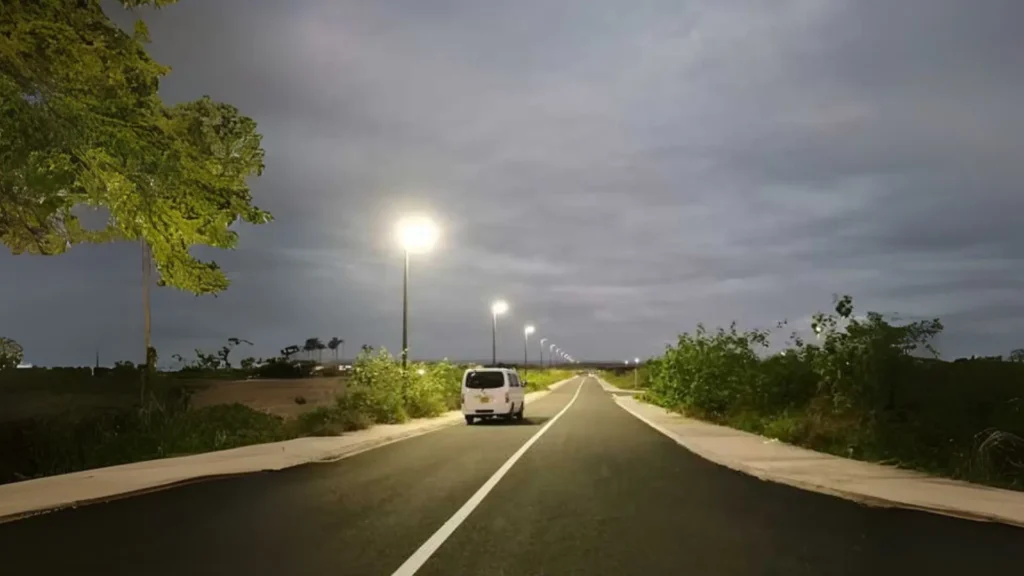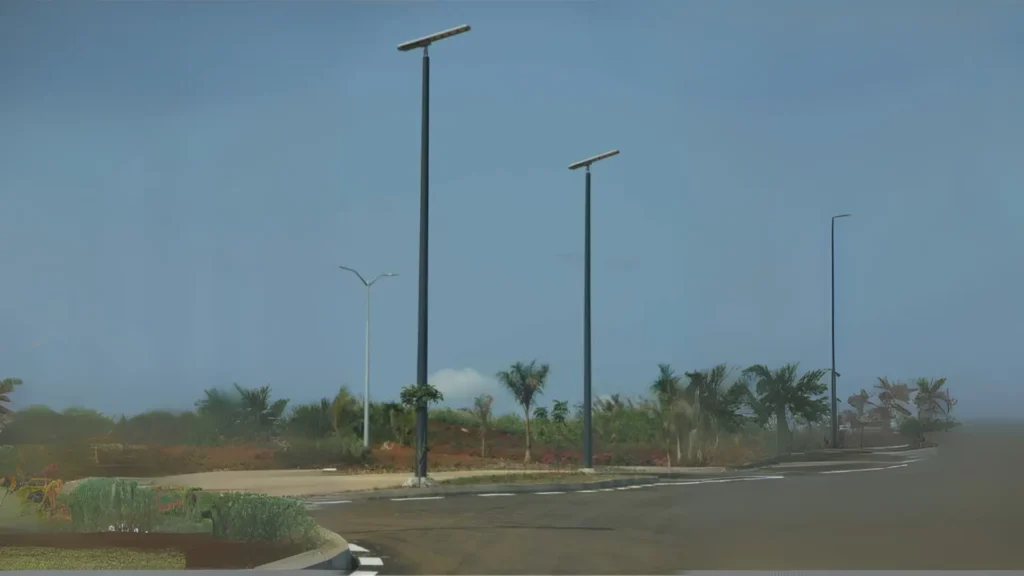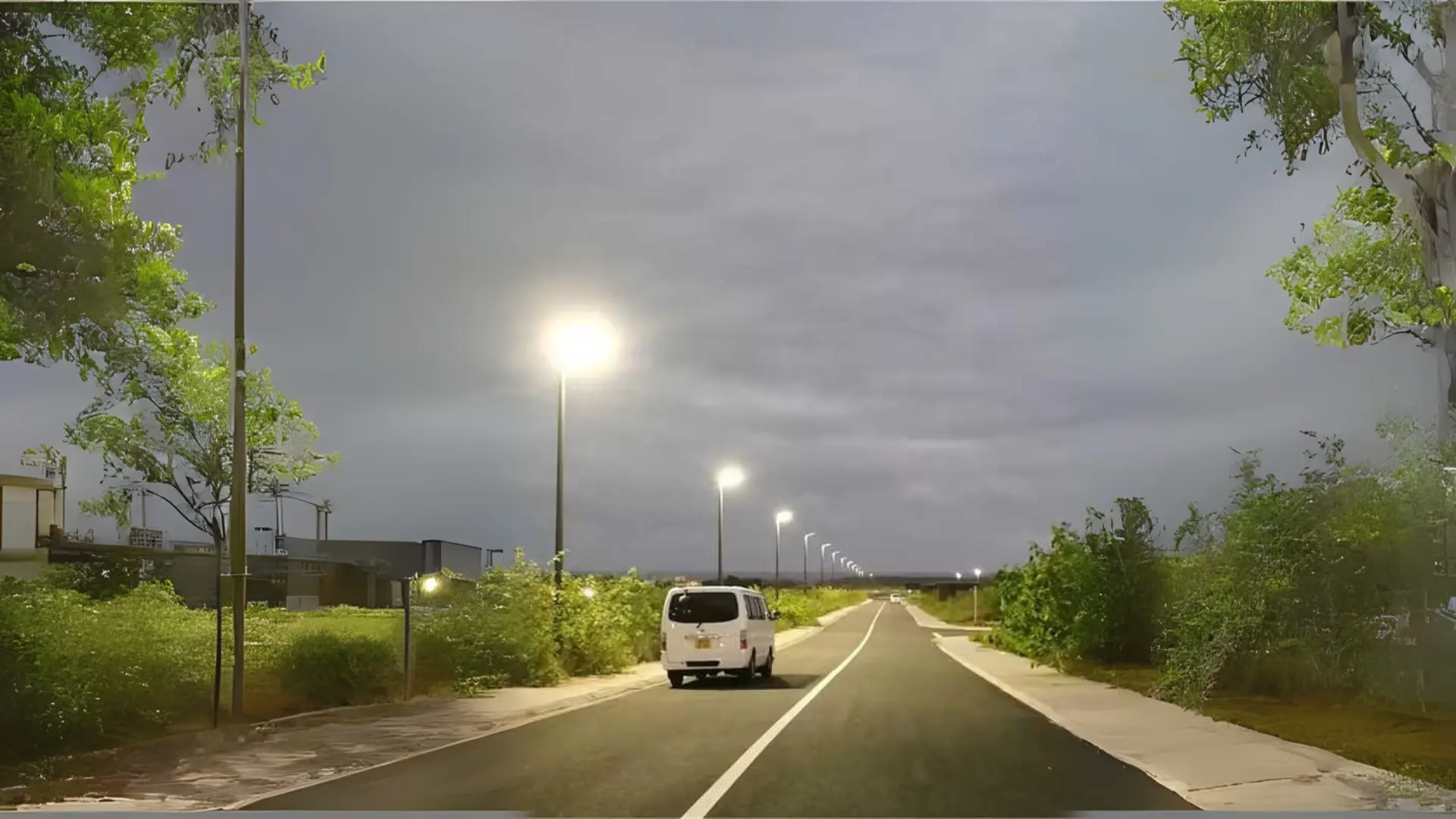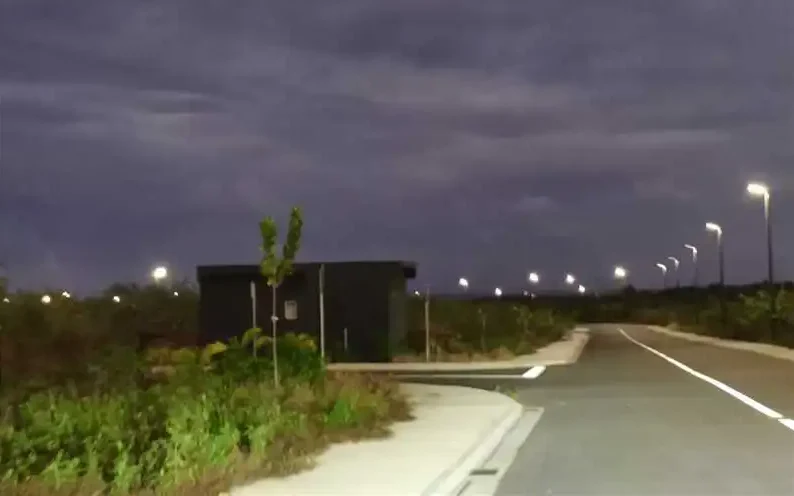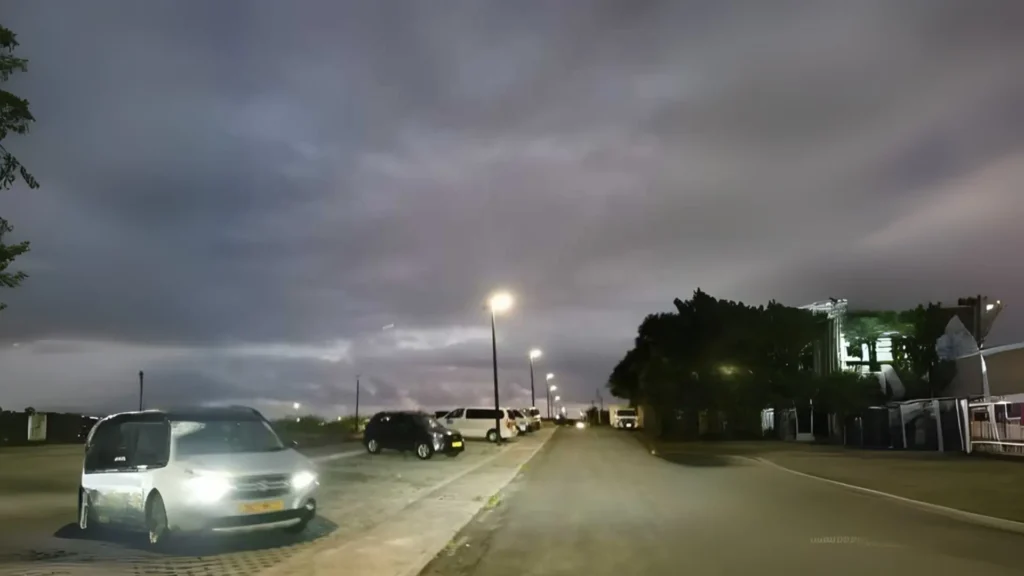Abstract
This paper explores the successful implementation of the Mauritius Smart City Solar Lighting Project. By deploying the high-end THERMOS series solar street lights under the Sresky brand, the project achieved a comprehensive upgrade of urban road lighting while setting an industry benchmark in promoting sustainable development, enabling intelligent management, and significantly reducing operational costs.
1. Project Background and Needs Analysis
1.1 Project Background
Mauritius is an island nation in the Indian Ocean, renowned for its abundant natural resources and strong commitment to sustainable development. As part of the national green economy strategy, the Mauritian government actively promotes “smart city” development, aiming to create modern, efficient, and environmentally friendly urban infrastructure through renewable energy and smart technologies. Nighttime road lighting, a critical component of urban safety and city image, has been identified as a priority for upgrading. The project’s objective is to replace traditional grid-powered streetlights with 100% solar lighting to reduce carbon emissions, lower energy costs, and advance energy independence. This initiative aligns with global energy transition trends and enhances Mauritius’ international reputation for green development.
1.2 Core Challenges and Needs Analysis
During initial project planning, the team identified four core challenges that directly influenced the selection and implementation strategy for the lighting solutions:
-
Climate Adaptability: Mauritius features a tropical marine climate with average annual temperatures between 20–30°C, high humidity, and frequent rainy seasons. Solar streetlights must operate stably during prolonged cloudy or rainy periods while withstanding high temperatures that can damage batteries and electronics.
-
Intelligent Management: Smart city requirements demand streetlights with intelligent energy management and lighting control to enable on-demand lighting, reduce energy waste, and minimize manual maintenance frequency and cost.
-
Operational and Maintenance Cost-Effectiveness: In dusty or polluted environments, solar panels accumulate dust that reduces charging efficiency. The project requires a low-maintenance-cost solution to ensure sustainable economic benefits.
-
Lighting Reliability: Road lighting directly affects nighttime traffic safety and pedestrian comfort. Whether on cloudy nights, dawn, dusk, urban main roads, or curved side streets, streetlights must provide continuous, uniform, and high-quality illumination to eliminate safety risks.
These demands set high technological standards, motivating the team to select a solar lighting product combining durability, intelligence, and efficiency.
2. Technical Solution Design: Sresky THERMOS’ Perfect Fit
After multiple rounds of technical evaluation and on-site testing, the project team selected the Sresky THERMOS series of solar-integrated streetlights as the core solution. This series, with patented technology and outstanding performance, precisely addresses all challenges of the Mauritius project.
2.1 Core Technical Advantages
-
All-Weather Stable Operation (ALS + TCS Technology)
-
Intelligent Lighting Control System (ALS – Adaptive Lighting System)
Designed for Mauritius’ rainy and cloudy climate, ALS uses intelligent algorithms to predict weather changes and dynamically adjust power output. Even during continuous rainy weather lasting over 10 days, the streetlights maintain stable illumination, overcoming limitations of traditional solar streetlights dependent on weather. Test data shows streetlights with ALS exhibit a significantly smoother brightness decay curve under no sunlight than traditional systems, ensuring continuous, reliable lighting. -
Temperature Control System (TCS)
In tropical high-temperature environments, battery overheating shortens lifespan. TCS monitors ambient temperature in real time and pauses charging when temperatures are too high, preventing battery swelling, degradation, and safety hazards. Experiments show this extends battery life to over 1.5 times that of conventional products, ensuring reliable long-term operation in high temperatures.
-
-
“Zero Maintenance” Intelligent Design (Automatic Cleaning + Smart Control)
-
Patented Automatic Cleaning System
A key feature of the THERMOS series is its built-in automatic cleaning. Solar panels are equipped with reciprocating brushes that automatically remove dust, bird droppings, and debris at scheduled times daily, maintaining charging efficiency above 21%. This design reduces manual cleaning frequency and cost, providing a true “zero maintenance” experience. -
PIR Smart Sensing and Multi-Mode Control
Equipped with PIR infrared sensors detecting activity beyond 8 meters, the streetlights accurately sense pedestrian and vehicle movement. Combined with three preset lighting modes (e.g., M1: 30% constant brightness, 100% brightness upon activation; M2: time-based dimming + PIR), this enables dynamic lighting: “lights turn on when people arrive and dim when they leave,” saving energy during low-traffic periods and optimizing consumption.
-
-
Exceptional Luminous Efficiency and Durability
-
High-Efficiency Output
The THERMOS series uses LED chips with luminous efficiency up to 230 lm/W, providing brightness from 4,000 to 12,000 lumens, suitable for diverse scenarios including urban main roads, secondary roads, and pedestrian streets. Test results show superior light uniformity compared to traditional streetlights, enhancing nighttime visibility. -
Industrial-Grade Protection
The lamp body is constructed of aluminum alloy and PC material, rated IP65 (dustproof and waterproof) and IK08 impact resistant. It withstands heavy rain, strong winds, and external impacts, ensuring long-term stability under Mauritius’ complex climate.
-
3. Project Implementation and Deployment
3.1 Precision Deployment
The team customized deployment plans according to the function and width of roads within Mauritius’ smart city. Different THERMOS models are paired with installation heights ranging from 4 to 12 meters to optimize lighting coverage and uniformity. For instance, high-brightness models serve main roads, while medium-power models illuminate curved secondary roads, balancing energy consumption.
3.2 Streamlined Installation
The integrated design and 0°–180° adjustable angle brackets of the THERMOS streetlights significantly simplify installation. Construction teams follow standard steps—digging foundation pits, securing foundation cages, installing lamp bodies, and calibrating angles—to complete deployment efficiently.
3.3 Successful Implementation
The Sresky THERMOS series streetlights have been deployed across multiple areas of Mauritius’ smart city initiative. Since implementation, no major faults have occurred, fully validating the system’s reliability and durability.
4. Project Outcomes and Impact
4.1 Social Value
-
Enhancing Public Safety
Stable, high-quality lighting has greatly improved nighttime visibility for drivers and pedestrians, leading to a reduction in traffic accidents and crime rates. Citizen feedback indicates a marked increase in safety perceptions during nighttime outings. -
Highlighting Smart City Image
As a flagship smart city project, this case demonstrates Mauritius’ leadership in green technology applications to the global community, boosting its international reputation and appeal.
4.2 Economic and Environmental Value
-
Zero Electricity Costs and Zero Carbon Emissions
The solar-powered streetlights operate entirely on solar energy, saving millions of Mauritian rupees annually in electricity costs while achieving a “zero carbon emissions” lighting system, making a significant contribution to environmental protection. -
Low Maintenance Costs
The combination of automatic cleaning and industrial-grade durability reduces maintenance costs to one-tenth of those for traditional streetlights, generating substantial economic benefits.
Conclusion
The Mauritius Smart City Solar Lighting Project perfectly integrates technology and demand. The Sresky THERMOS series, equipped with three core technologies—automatic cleaning, ALS intelligent light control, and TCS temperature protection—not only overcomes challenges posed by tropical climates but also delivers safety, economic, and environmental sustainability benefits to the city.
